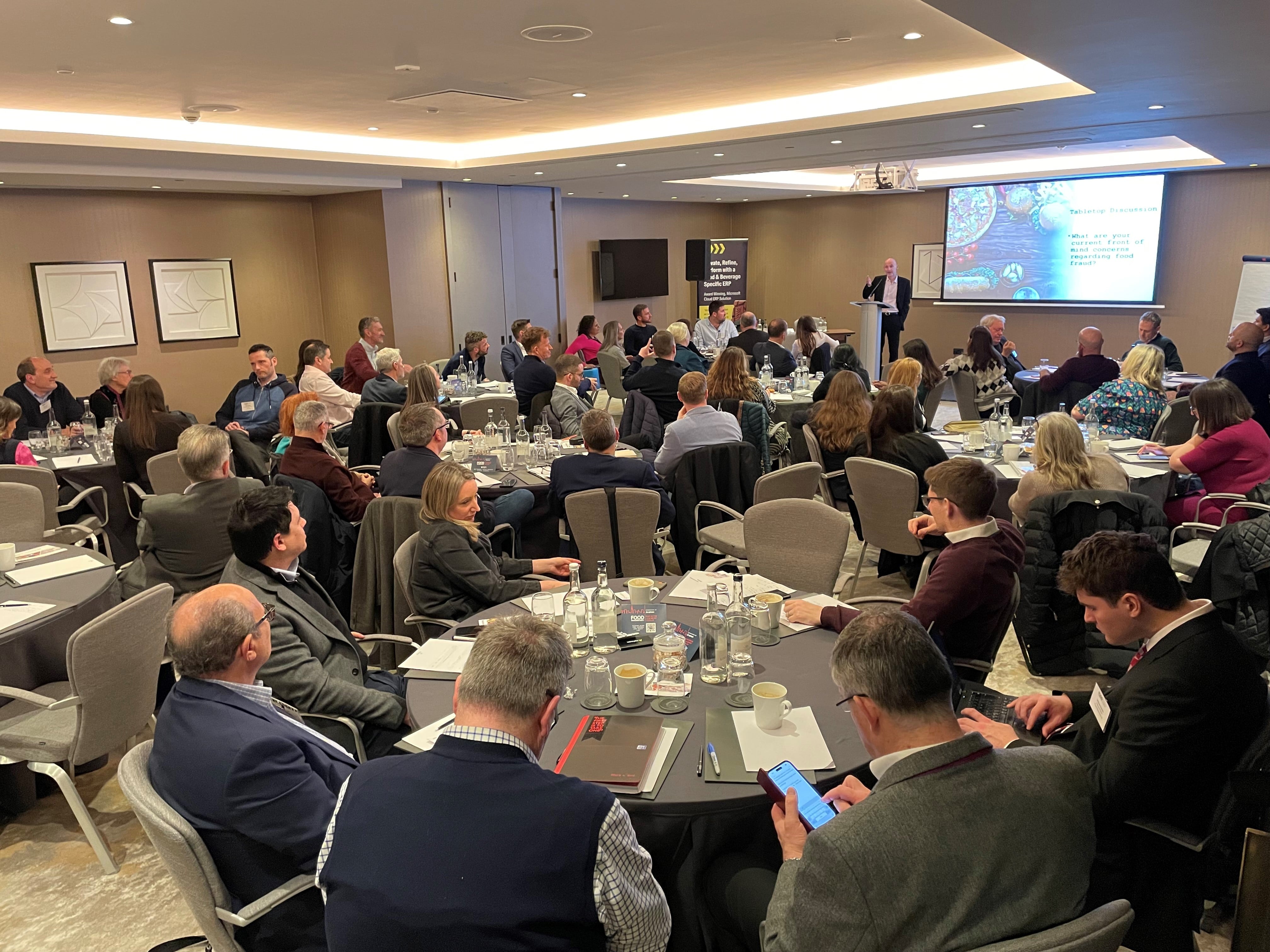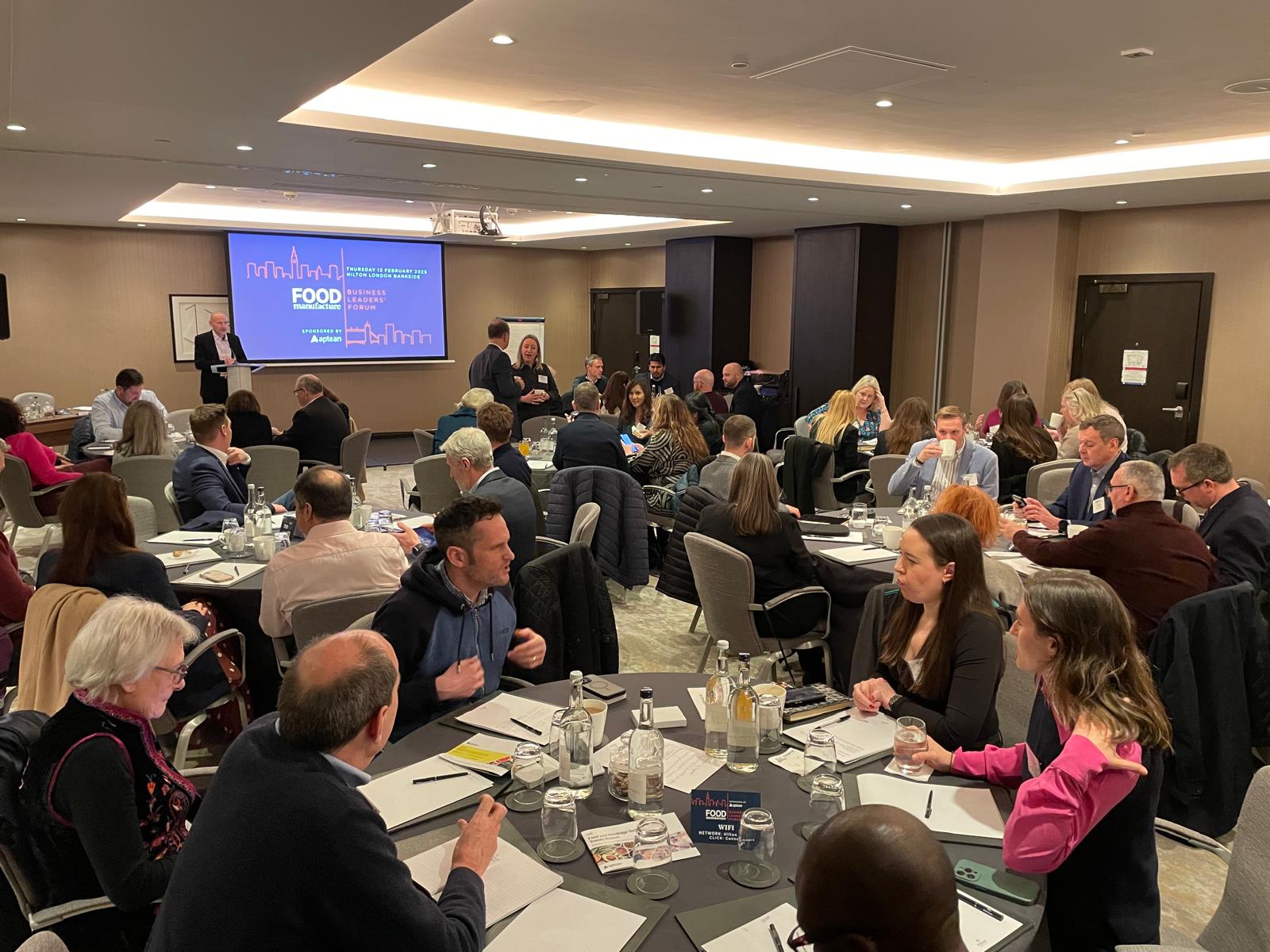Food Manufacture’s Business Leaders’ Forum brings together voices from the industry to discuss, under Chatham House Rules, challenges and opportunities they face in the food and drink sector. It’s a unique event that invites collaborative-thinking and knowledge sharing, with the attendees shaping the agenda. Most members of the community will agree it is a day well spent out of the office or factory.
So it was apt that the value of meeting up in person was raised by the room – not just at events like Food Manufacture’s Business Leaders’ Forum (although that was definitely mentioned!) but also for customer visits.
Getting your priorities straight
The room agreed making time for these events is of the utmost importance but acknowledged that it’s hard work when there is already so much expected from you. Indeed, as a leader it can often feel like you’re pulled in every direction – a pressure felt perhaps more acutely by smaller, scaling companies.
“The cost pressure is greater and the resource smaller – all the while customer demand is growing,” as one delegate aired.
Artificial intelligence was raised as one of the potential solutions to spinning plates, with a few of the delegates offering examples of how they have used AI to help speed up tasks and organise their workflows. Names of platforms such as Chat GPT, Fyxer and Co-Pilot were dished out as recommendations among the crowd.
“We use it to take notes during meetings”, and “to organise our inbox” were titbits shared, but there were also more complex examples, such as AI used to examine price increases, energy wastage and spot packaging errors.
One delegate outlined the benefits succinctly: “We’re exposed to 10,000 data points a day – that’s too much to process for a human. We use AI to identify where we can to improve quality and productivity.”
While a few expressed a nervousness around AI at the Forum, Aptean’s latest trend report revealed a changing tide in attitudes in the sector. In 2023, its study showed that just 6% of food and drink businesses were using AI, this jumped to 28% in 2024. Moreover, the percentage of F&B businesses who had no plans to leverage AI has drastically fallen, from 30% to just 4% – showing a significant increase in AI appetite in just a year.
The study’s findings echo the examples shared in last week’s Forum, indicating that automation of routine tasks is the most popular way food and drink companies are currently using AI, with 35% of businesses using it to carry out tasks such as ingredient sell-by date management and customer order entry. This is followed by better customer insights and engagement – with 33% using AI to analyse customer feedback and market data to identify trends and opportunities for product innovation.
Despite stretched resources, recent findings from FoodJaw Manufacturing Analytics show that the value of food production is rising as a result of productivity gains – estimated to be worth £2.15bn.
The data shows that the UK food production industry was valued at £28.4bn – a rise of 8.3% in Q4 2024 compared to the same period in 2023. Increased food output pushed the total value of UK manufacturing output in 2024 to £609.2bn – climbing, albeit marginally, from £607.6bn in the previous year.
This 0.26% increase in production was lower than growth in previous years – but it was achieved despite a 19,000 reduction in the number of people in the UK manufacturing workforce.
Mental well-being in food and drink production
Whilst the sector should be congratulated for its incredible efforts, it does not come without its toll and it’s evident that the F&B industry is feeling the pressure.
As one Forum delegate said: “We need to be more honest about how things are. Social media can make things look very rosy, but it’s challenging.”
And as another stated: “There has been an incredible amount of work put into physical health and safety but not as much into mental wellbeing.”
Health and safety should, of course, remain top of mind but the impact of poor mental health can be just as harmful to individuals and businesses alike. In 2023/24, the Health & Safety Executive estimated that 16.4m working days were lost in due to work related stress, depression or anxiety.
Within manufacturing and engineering specifically, 16% of workers say they have experienced burnout.
Food Manufacture’s business leaders’ poll which was drawn during the session found a significant spike in the number of requests for mental health and well-being support since 2020, with 74% reporting they’d seen an increase, 21% no change and only 5% a drop.
This could indicate several things – that mental health is becoming a more openly discussed topic, that general well-being is in decline since the pandemic, or, indeed, a combination of the two.
The good news is that polling indicated that mental health awareness and acceptance is improving – at least among those in the room – with 81% of the business leaders sharing they felt it safe for them or their teams to raise mental health and wellbeing in their workplace.
Many workplaces are putting in mechanisms to help support wellbeing too, signposting where help can be found and providing a raft of services, which among the delegates ranged from flexible working policies (88%), access to counselling/support (64%), financial planning/advice (45%) and discounted gym memberships (42%), among others.
Our polling data found that only 8% said they did not provide any benefit or support specifically related to well-being, with 49% providing perks and help through a third-party provider, and 43% through their own internal resources.
Mental health stigma sticks, despite affecting many
Still, despite progress, stigma around mental health undoubtedly remains.
“There are a lot of people suffering with mental health issues that don’t feel like they can ask for help,” Amy Wilkinson, founder of Fearless Foodies – a food industry-specific leadership development company told Food Manufacture.
“I am open about it, but I experienced my own burnout – which inspired my work today – and I remember feeling so worried that if I spoke to someone it would reflect badly on me. It wouldn’t have, I know that now. But I think we are kidding ourselves if we say that this doesn’t still have a stigma attached to it. We are in a hard industry, you have to be resilient – but, actually, that’s not easy.”
Interestingly, our business leaders poll found that whilst 61% of companies in the room undertook a wellbeing survey either monthly, annually or bi-annually, 39% did not survey at all. This begs the question that whilst businesses put in place well-being perks and lines of support, that more companies should actually be asking for their employees’ feedback.
Adding further dialogue, another attendee said: “In reality, the people truly suffering are those who don’t always share their experiences.”
They reasoned whilst you can put mechanisms in place to prevent from serious mental health breakdowns, “it’s almost impossible to know [how someone is really feeling]”.
It was deeply saddening to hear of multiple stories of suicide from the room and highlighted the profound impact mental health has on the community.
A delegate of the forum questioned whether we need to assess teams on their resilience and ability to withstand setbacks in the future, assigning people on their strengths and ensuring they are put in the rights roles and places.
Whilst another raised the issue of a lack of training and support for managers in how to deal with team members who do seek for help. They emphasised the importance of businesses equipping and empowering leaders with the right information to manage such situations proactively going forward.
It was also noted that certain training should be mandatory, with one delegate in the room recounting a time when they held a menopause awareness workshop where, amongst the crowd of women, just one man turned up.
Among a raft of symptoms, menopause can cause anxiety, they pointed out, and that needs to be appreciated and understood by all.
Indeed, according to perimenopause and menopause specialists Health & Her, more than 370,000 working women in the UK aged between 50 and 64 have left or considered leaving their career because they found that dealing with menopausal symptoms in the workplace is too difficult. Yet only 0.6% who experience difficulties during menopause will speak to their employer about their symptoms.
But as another delegate raised, men need protecting too – as they explained that often it will be males who don’t vocalise their feelings.
As the Mental Health Foundations reports in 2019 there were 5,691 suicides registered in England and Wales. Of these, three-quarters were among men, which has been the case since the mid-1990s.
How far can leaders go?
Whilst we do need to ‘protect’ employees – especially those who are vulnerable – other delegates raised the difficult but important question of balance. When and where do you draw the line if a team member is really struggling but you have provided all the sufficient provisions you can?
“We need to be looking for those who can ‘take a few more hits’ because our industry is so turbulent,” an attendee suggested.
Of course, a job needs to be the right fit; we aren’t all built to be surgeons, singers, or indeed food engineers – and that’s ok. We have different strengths, different things we excel at, different pressures we’re able to manage – and no job is worth jeopardising one’s mental wellbeing for.
The conversation led naturally onto the pressures leaders feel and if that pressure is more intense. Delegates questioned whether a position of power, coupled with a tough working environment, sets unrealistic ‘superhuman’ expectations on managers and C-suite. After all, just because you’re at the helm, good at your job and can handle the hardships, doesn’t mean you don’t struggle too.
One attendee acknowledged that, certainly, the higher you go, the harder it gets, but equally as a leader you have more control of the environment you are in.
“There’s definitely more pressure as a leader – different pressure though,” they added.
“Being a leader, especially at the very top, can become quite a lonely experience. I think it’s therefore really important to develop a support network around you – whether that’s in the form of trusted work colleagues or mentors or through a professional coach or counsellor,” Jon Poole managing director of Step Change Development, an independent consultancy focusing on organisational development, told Food Manufacture after the event.
“In my experience, often most of the pressure comes from within ourselves rather than external pressure from others and so I would encourage everyone to take a step back from time-to-time to recognise this and try to re-assess their true priorities.”
It’s always a privilege to host our Business Leaders’ Forum which gives way to insightful and honest conversations, but this session was a particular highlight. It reflected how far we have come as a society to talk so openly about stress and well-being, and I hope fuels further progress in the future.
Vanessa Richardson, deputy director general of the UK Potato Processors’ Association agreed, telling Food Manufacture post-event: “The session encouraged participants to speak up which was unique and refreshing. I was really pleased to hear that things seem to have moved in the right direction in the last 5-10 years and I really hope that workforce mental health concerns are no longer seen as a tick-box exercise but have become embedded into business culture to benefit both workers and businesses.”
Where can I get support?
As was raised at the session last week, GroceryAid is an excellent platform for those experiencing hard times. Since 1857, this charity has been helping people within the food and drink industry with financial, emotional and practical support.
“Taking the time to look after your mental health and wellbeing is important and can help you successfully overcome difficulties, feel more positive and get the most out of life,” Mandi Leonard, welfare director, at GroceryAid told Food Manufacture, post-event.
“At GroceryAid, we know life can be challenging, so we offer a range of support services for anyone struggling with stress, anxiety, low mood or depression. If you’re experiencing any of these things then we are here to help anyone in the manufacturing industry who is struggling.
“Our trained counsellors are always available on our free and confidential helpline – 24 hours a day, 365 days a year. They provide ‘in the moment’ support and can make referrals to specialist assistance. This includes counselling sessions, workplace support and help for those caring for family members.
“On the GroceryAid website you will also find self-help wellbeing sessions to help you with your mental health. You can work through a range of topics which will support you in understanding your mental health and give you practical suggestions to make positive changes in your life.
“Whether you’re leading a team or starting your career, colleagues at all levels in the grocery industry can turn to GroceryAid for support. Call our helpline on 08088 021 122 or visit groceryaid.org.uk/get-help.”
February 2025’s Business Leaders’ Forum was proudly sponsored by Aptean.





